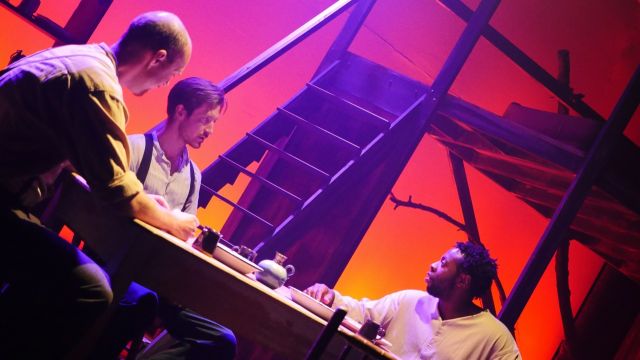Desire Under The Elms
There is a small core of classic playwrights, but some are eternal, and some are of their time; not thematically, for they all use the same tropes and traditions of universal storytelling, but in terms of language, sophistication and their ability to connect with us years later. Shakespeare wrote for the masses 500 years ago, and yet is timeless. Eugene O’Neill wrote less than 100 years ago – yet seems dated in his storytelling, even though both wrote about the same themes many times over.
So, whilst the themes are relevant today – greed, jealousy, lust, vanity – the way of telling them, in O’Neill’s case, is to take a sledgehammer and beat us around the head until we cave in. Whether one calls it melodrama or simply a lack of subtlety, O’Neill’s declamatory over the top style doesn’t just require the right actors and director, it requires the right venue - large, echoey, with the audience distanced as observers, in much the way that Greek tragedies played out in large open amphitheatres. It’s the only way I have ever seen O’Neill work on stage with a live audience, though, of course it works better on film, where the Larger than Life characters are 20 feet tall and the audience are destined by technology to be observers at arm’s length (or more). Coupled with this style – which belongs very much to the early twentieth century – one needs actors capable of expanding emotional arcs through subtext and body language. Without the subtlety of Yin and Yang, the drama moves from being confronting to invasive.
I can’t think of a more inappropriate performance space for O’Neill than The Loft at Chapel off Chapel. Andrei Schiller-Chan’s production has much that is worthy and admirable about it, not least of all his commitment to resurrecting the play in the first place, but it simply cannot overcome the fact that it is in the wrong theatre. Whilst this company’s last offering – The Exonerated – was built on intimacy, and was perfect for the space, Desire Under The Elms (at school we called it A Poke Under The Oak) is in a constant battle with the space itself. Thus, a full on fist fight between father and son is reduced to an over choreographed scuffle: every line of makeup to age an actor, clearly 35 years too young for the role of the father, shows in the tiny space – and strips the play of its credibility, and there is nowhere to move past the furniture in the blocking. The whole play becomes clunky, and the cracks start to show quite early… and all because of the performance space.
Hahna Read’s skeletal set is impressive (looking almost Japanese) and makes the best use possible of the space, and Travis McFarlane’s evocative lighting is a great boon to the production. The choice of music is superb and tasteful and the early visuals are a treat. Schiller-Chan has the ability to paint portraits with his actors which draw the eye and engage the mind, without touching the emotions.
The wonderful Garikai Jani and Timothy Smith excel as the two older brothers and the first scene is a treat, evocative and full of humour. Even the New England accents work brilliantly. Too soon they are gone – and it’s to O’Neill’s detriment that he didn’t see how having them return could have added such extra dimension to the storytelling. Darren Mort is simply too young to play the 75 year old patriarch Ephraim, and there is not truth in his long expositionary monologue about his life. It doesn’t breathe, it lacks emotion, even sublimated, and that makeup doesn’t help. There is no sense that he is an old man reliving his life in its telling.
Sam Lavery has moments of absolute clarity as the youngest son Eben, bitter at being robbed of his mother’s farm. There are moments to cherish in his performance, but they are damaged by his expressions of anger being expressed by loudly shouting lines in an already confined space. He, and his director, should explore the subtlety of ‘white rage’ hissed through clenched teeth, menacing and tense (think Brando) and play that against the declamatory style of his father. The performances need individuality and contrast where there is none at present.
Diana Brumen (Abbie) is simply too young and inexperienced for the role as O’Neill wrote her, though she gives it her best shot. She lacks seduction and sensuality and both of these are imperative for the play. The horrific scene at the end of the play simply doesn’t work because of her tentative approach and lack of strength in pressing the pillow down. We don’t believe it - I almost expected the last sound of the play to be a baby crying - and that would have at least given scope for some interesting discussion afterwards, plus a glimmer of hope in a play which is bleak in the extreme.
I still believe in this company and in Schiller-Chan’s talent – and I hope the third production will be space appropriate so that all the other important elements have a chance to shine.
Coral Drouyn
Subscribe to our E-Newsletter, buy our latest print edition or find a Performing Arts book at Book Nook.

